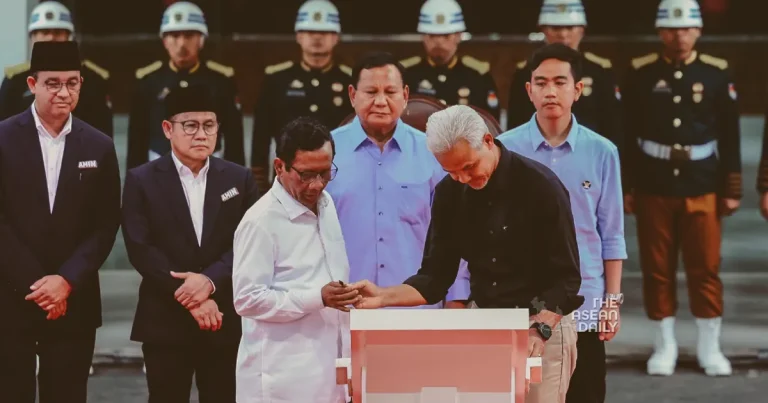17-12-2023 (JAKARTA) In the heart of the vibrant political landscape of Indonesia, the 2024 election campaign has reached a critical juncture, marked by a series of televised debates that promise to shape the narrative for the nation’s future. The weeks leading up to the first round, held on Dec 12, were shrouded in uncertainty, particularly concerning the debate format and regulations. Central to this uncertainty was the question of whether a clear distinction would be maintained between debates featuring the presidential candidates across three rounds and those involving the vice-presidential candidates in two rounds.
The initial suggestion that the two vice-presidential debates might be eliminated fueled speculation and raised eyebrows, with accusations of favoritism towards Gibran Rakabuming Raka, President Joko Widodo’s son and the vice-presidential candidate alongside frontrunner Prabowo Subianto. Gibran’s perceived lack of debating prowess compared to his more seasoned counterparts, Mahfud MD and Muhaimin Iskandar, intensified the concerns.
The General Election Commission eventually resolved the matter by mandating the presence of all candidates in every round. However, in the vice-presidential debates on Dec 22 and Jan 21, presidential candidates will accompany their potential running mates, with a stipulation that while they may speak, they cannot dominate the stage.
The First Act: A Glimpse into the Debate Dynamics The inaugural debate delved into six crucial themes: Law, human rights, governance, corruption eradication, bureaucratic reform, and the fortification of democracy. Moderated by two hosts, the event featured 11 panelists, experts in their respective fields, responsible for crafting incisive questions and randomly assigning them to the three candidates.
Participants had the opportunity to pose questions to each other, leading to some heated exchanges, particularly between Prabowo and Anies. However, the seasoned politicians showcased their political finesse, skillfully navigating tough questions without committing to definitive answers.
In the author’s perspective, the standout performer of the night was Anies Baswedan. Presenting himself as a proponent of change, Anies exuded assertiveness and took an early offensive stance, positioning himself as a catalyst for transformation. Leveraging his intellectual background, Anies seamlessly incorporated data to strengthen his arguments, strategically emphasizing “change” as the central theme of his campaign. This deliberate contrast with President Jokowi’s administration solidified Anies as a formidable opposition figure.
Conversely, Prabowo Subianto appeared defensive, particularly when addressing questions about past human rights violations in Papua and Anies’ challenge regarding the Constitutional Court’s decision allowing Gibran to run as a vice-presidential candidate. In response to allegations of involvement in the kidnappings of pro-democracy activists in 1997-98, Prabowo claimed that those issues had been resolved, asserting support from former victims. Ganjar Pranowo, adopting a middle-ground stance, seemed somewhat uncertain in his positioning, avoiding sharp contrasts with Jokowi but lacking memorable moments in his debate performance.
Temper and Tactics: Prabowo, Anies, and the Art of Political Campaigning Prabowo and Anies undeniably dominated the stage, with Anies skillfully probing Prabowo’s human rights record, revealing Prabowo’s quick temper and condescending tendencies. Towards the debate’s end, Prabowo defiantly declared his lack of fear in losing power, delighting his supporters by mocking Anies through gestures reminiscent of his “goyang gemoy” dance.
The debate, essentially a dialogue, diverged from the fervent tones of the 2014 and 2019 presidential campaigns, where Jokowi faced Prabowo. In 2014, the campaign centered on preserving reform and democracy, portraying Prabowo as a threat to these values. In 2019, identity politics played a divisive role, with Jokowi cast as a symbol of tolerance against Prabowo’s perceived conservatism.
The landscape of the 2024 election seems different, marked by a noticeable effort to temper passion in campaigning. Prabowo, once the fiery nationalist warrior, now presents a more relaxed persona, opting for dance over fervent speeches. Political slogans have shifted towards a cheerful tone, emphasizing candidates’ likability over serious political discourse.




